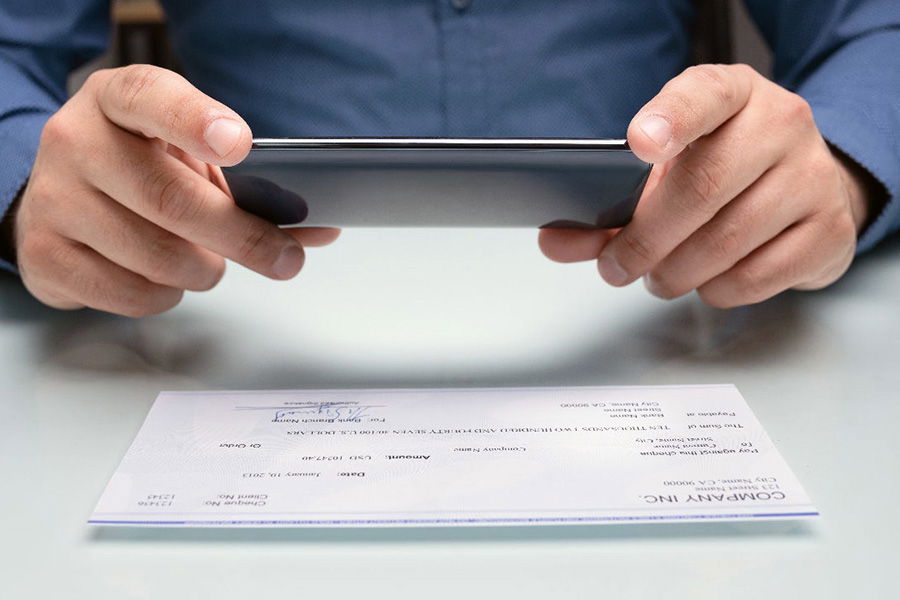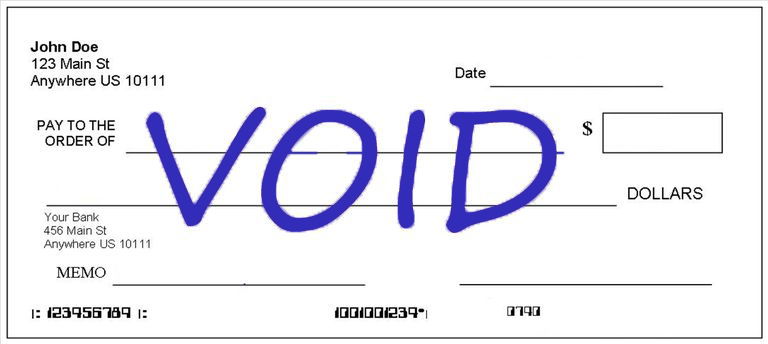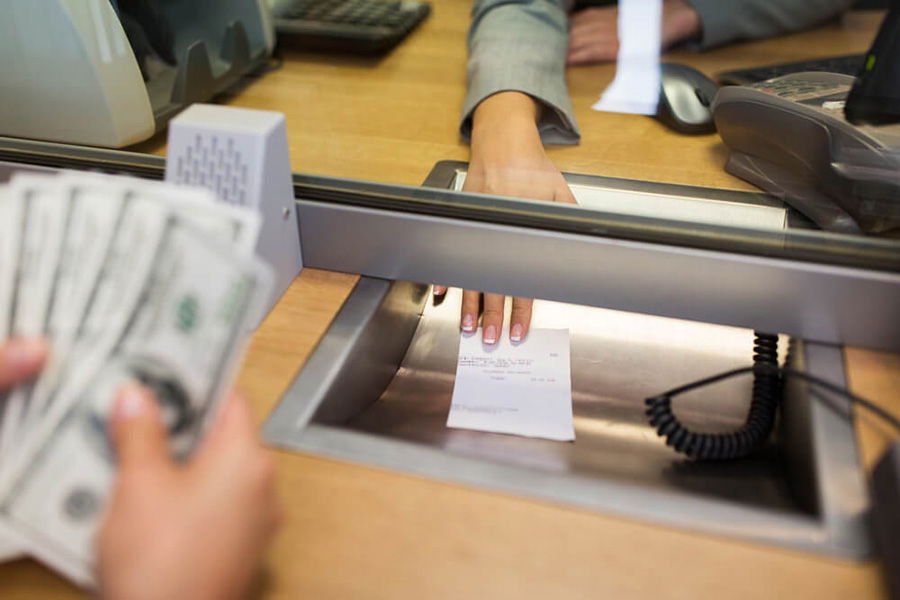At some point, a friend, family member, or business partner may ask you to deposit a check for them. If this happens, you may wonder if you can deposit a check for someone else.

You might be surprised to learn that the answer is “yes,” as long as it has their signature on it or the phrase “for deposit only.” Here’s everything you need to know about depositing someone else’s check.
Key Takeaways
- Depositing a check for someone else is possible with the payee’s endorsement or a “for deposit only” note.
- Methods for depositing someone else’s check include using a deposit slip, writing “for deposit only,” mobile check deposit, and mail deposits.
- Make sure you understand the deposit policies, keep the check secure, and ask for a receipt to ensure the deposit is successful and to avoid potential risks and scams.
Reasons Someone May Ask You to Deposit Their Check
Ideally, everyone would deposit their own checks. But there are some situations in which people won’t or can’t. Someone might ask you to deposit their check because they’re busy or out of town yet need the funds in their bank account as soon as possible.
They may also want to use the check to pay you back, or are too young or too old to deposit their own check. Another unpleasant yet feasible possibility is that a stranger may be trying to scam you out of money.
Is it possible to deposit a check for someone else?
In short, you can deposit a check for someone else. However, there are certain stipulations you must meet. First and foremost, the payee’s signature endorsement or the phrase “for deposit only” should be on the check. This will depend on the bank or credit union, as every financial institution has their own policies.
Furthermore, you can only deposit the check into the payee’s checking account. Unfortunately, you can’t make the check out to yourself or deposit it into your own bank account. In fact, doing so is illegal and a form of check fraud. In a perfect world, the payee of the check would make the deposit themselves. While it’s possible to deposit a check for someone else, this can pose a security risk.
How to Deposit a Check For Someone Else
If you do decide to deposit a check for someone else, there are numerous ways you can do it, including:
1. The Deposit Slip Method
The ideal way to deposit a check for someone else is to use a deposit slip. A deposit slip is a short form that includes information about a potential check deposit. The form will include the payee’s full name as well as their account number, so the bank teller knows where to deposit the funds and puts the money into the correct account.
It will also explain whether the deposit is made up of check, cash, or if the person depositing the check wants a specific amount of cash back. Compared to other methods, the deposit slip method is highly recommended.
Ask the payee to fill out the slip and endorse the check. Then, you can deliver these items to the bank or credit union for them. As long as the payee fills out the slip thoroughly and accurately, you shouldn’t have any problems.
All you’ll have to do is give the deposit slip to the teller, and they will take care of the rest. If you do go this route, don’t forget to ask for a receipt that shows the money was deposited to the payee’s bank account. You can give the payee this receipt so that they know their funds made it to their account.
2. The “For Deposit Only” or FDO Method
If the person who received the check can’t complete a deposit slip, don’t worry. There’s another strategy you might want to consider, known as the “For Deposit Only” method. There are two ways to go about it as the person handling the check, including:
- Option One: This is where the payee or the person who the check payable to would write “For Deposit Only” in the endorsement area and endorse the check themselves. In addition, they would jot down the account number they’d like the funds to get deposited into. Also known as the restrictive endorsement method, this is a lot like the deposit slip method and leaves little room for issues. It prevents any other person from cashing the check.
- Option Two: You’d go with this option if the payee is unable to endorse the check with their signature. All you would do is write “For Deposit Only” in the endorsement area. While this option is less secure than the first one, it’s still feasible. If the payee name and bank account number match up, it should work out.
3. The Signature Only Method
The signature only method is the least secure because it’s known as a blank endorsement. This means the payee of the check endorses it with their signature and nothing else. So, what does this mean for you as the person who is handling the check? It gives you the ability to cash the check and pocket the money.
You might also lose the check and be unable to recoup the funds. Of course, this method is less of a concern if the check payee trusts you, and you promise to do everything possible to protect the check and ensure the funds go into their account. However, it should still be a last resort as it’s the least safe of all the methods.
4. Mobile Check Deposit
These days, most banks and credit unions, like Bank of America, Citi, and Chase offer mobile check deposits. This lets you deposit checks from your mobile device. This means you don’t have to drive to a bank and wait for a teller.
If you’re logged in to the payee’s mobile banking app, and they’ve endorsed the check, you should be able to deposit the check via mobile deposit. This option might make sense if the payee is a close friend and family member that trusts you yet doesn’t feel comfortable with this type of advanced technology. You can download the bank’s app on your own phone or use their phone to do so.
5. Deposit a Check by Mail
Believe it or not, financial institutions typically allow for check deposits via mail. To do this on behalf of the check recipient, ask them to endorse the check and indicate which account they want the money deposited into. Once they do this, send the check to your bank or credit union’s deposit address via FedEx or another carrier.
Check with the financial institution directly for more information. Keep in mind that this is the slowest method for depositing checks, so it might not make sense if the payee needs the funds as soon as possible.
Tips for Depositing a Check for Someone Else
Before you go ahead and deposit a check for someone else, keep the following precautions in mind.
- Understand the deposit policy: Reach out to the bank or credit union or visit their website to learn about the bank’s policies and what the bank requires. Make sure they’ll allow you to deposit a check for someone else in the first place. If they don’t allow this, you’ll have to find an alternative solution.
- Keep the check safe: If someone gives you a blank signed check, store it away somewhere safe. Don’t leave it out in the open or touch it until it’s time to deposit it, or you may lose it.
- Ask for a receipt: Typically, you’ll receive a receipt after you deposit a check for someone else. If you don’t, ask for one. Otherwise, you won’t have any physical proof or way to verify that you went through the whole process of depositing.
What to Watch For When Depositing Someone Else’s Check
Even though you can deposit a check for a friend, relative, business partner, acquaintance, or anyone else, you should realize that there are some risks involved with such a deposit, including:
- You may be part of a check cashing scam: If you deposit a fraudulent check, you may be responsible for its entire amount. The financial institution might even freeze or close the payee’s account. This is a big deal.
- The funds might be delayed: Sometimes, it takes some time for the funds to go through after third party checks have been deposited. This means the person you’re depositing the check for might not have access to the funds right away.
- There’s no guarantee the deposit will work: Even if you do everything right, there’s a chance the deposit might not go through due to a technical glitch or another reason. If the payee doesn’t see the funds in their checking account in a few days, reach out to the issuing bank to resolve the situation.
- The payee may have exceeded their deposit limits: If you decide to deposit someone else’s check via mobile deposit, understand there is a monthly limit for their mobile check deposits. In the event they’ve already hit the limit, which may be $50,000, for example, your deposit won’t work.
- The check may bounce: If the person who wrote the check for the payee doesn’t have enough money in their checking account, the check may bounce. Bounced checks are more common than you might think.
Frequently Asked Questions
Who is the check payee?
The payee of the check is the person to whom the check written for, or the name listed under “pay to the order of”. Put simply, the funds or money value of the check are intended for them.
What does it mean to endorse a check?
An endorsed check has a signature on it. Most financial institutions require an endorsement before a check deposited.
What happens if the payee’s name is spelled wrong?
If the payee’s name is incorrect on the check, you can still endorse it. Simply ask the payee to provide two different signatures. One should be the misspelled name, exactly as it appears on the check, while the other should be their name spelled correctly.
What if there are two payees on the check?
It’s not uncommon for a check to be made out to two different people with two payee names. If the check says, “person A and person B”, both will need to endorse it so you can deposit it on their behalf. However, if it says, “person A or person B,” you’ll only need one signature.
Do you have to endorse a check to deposit it?
You may be able to deposit a check that hasn’t been endorsed without paying any monthly fees. However, you must be the payee on the check.
You may be able to deposit a check without an endorsement, even if the check hasn’t been made out to you. However, it may be difficult as many banks and credit unions don’t allow it.
Can I deposit the funds into my checking account instead of someone else’s?
If you have a check with someone else’s name on it, you can’t deposit the check into your own account. This is considered check fraud, which is a serious offense that can lead to significant fines and other consequences. Unfortunately, check cashing scams, which compromise a check’s legitimacy financial security, are fairly common.
What if the payee’s bank won’t let me deposit their check?
Some financial institutions state that payees must deposit their own checks, and there are no exceptions to this rule. In this situation, you can go to a fee-based check cashing company that might allow you to cash a friend’s check. While this is a straightforward process, be prepared to pay a large fee.
May I deposit my minor child’s check into my account?
Yes, ask your child to sign their name on the back of the check. Then, write the word “minor” next to their signature. Lastly, sign your name directly below your child’s and write down your account number. Then, deposit it into your own account.
Do I have to go to a local branch to deposit a check for someone else?
No. You can take advantage of a highly automated mobile check deposit method if the recipient’s financial institution allows for it. Third party check deposit via mail is another option.
Final Thoughts
It is possible to deposit someone else’s check. As long as you use one of the methods laid out above and take the necessary precautions, you shouldn’t worry about a long process. In fact, the process should be fairly easy. Just do your research and make sure the receiving bank allows check deposits from someone other than the payee.




